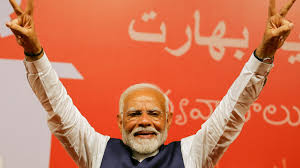Modi’s Election Shortfall Shakes Wall Street: An In-Depth Look

06.06.2024: Indian Prime Minister Narendra Modi’s recent election shortfall has left business executives and investors scrambling to understand the potential impact on India’s economy and investment landscape. Modi’s failure to secure a supermajority for his party has triggered a flurry of activity among market watchers and analysts.
A Surprising Setback
“Indian voters are great teachers. They have certainly surprised the politicians, exit pollsters, and market watchers,” wrote Venugopal Garre, managing director at AB Bernstein, in an email to clients.
Over the past few years, major U.S. companies have heavily invested in relationships with Modi, eyeing the vast potential of the Indian market. Companies like GE Aerospace, Apple, Starbucks, and Nvidia have all made significant moves to expand their presence in India. As China slows down, India has become a prime destination for U.S. tech giants, according to Pramit Chaudhuri, head of Eurasia’s South Asia practice.
Market Reactions
The Indian stock market reacted strongly to the election results, experiencing its biggest drop since 2021. Rahul Sharma, an emerging markets portfolio manager at Shafer Cullen, described the outcome as “a clear negative that is likely to create an overhang on the market over the near term.” Despite this, Sharma remains optimistic about India’s long-term prospects, citing the country’s favorable demographic profile and substantial growth potential.
Challenges Ahead for Modi’s Economic Agenda
Modi’s inability to secure a supermajority raises questions about the future of his economic reforms. Coalition governments often face difficulties in implementing economic plans, and Modi will need to negotiate and build consensus with other parties to push through his agenda. The goal of making India the world’s third-largest economy by 2027 remains ambitious, given the current economic challenges, including high unemployment rates.
Implications for U.S. Investments
The shift in India’s political landscape may prompt a reassessment of corporate expectations in the United States. While some reforms may take longer to implement under a coalition government, experts believe U.S. companies will continue to view India as a crucial part of their strategy to diversify manufacturing and supply chains beyond China.
Raghuram Rajan, former governor of the Reserve Bank of India, emphasized that U.S. corporate expansion into India is likely to remain unaffected by the election results. He pointed out that American investment in India has not been primarily driven by specific reforms but by the broader growth potential of the Indian market.
Social and Political Impact
The election results could also influence the social and political climate in India. Analysts predict that the BJP’s aggressive Hindu nationalist rhetoric may soften post-election, potentially reducing divisiveness and tension within the country. Modi has faced criticism over his treatment of minorities and efforts to silence political opposition. The election outcome might lead to a more inclusive and secure social environment.
Looking Forward
The formation of the new government and the upcoming release of the annual budget on July 1 will be crucial in setting the tone for India’s economic and political direction. Investors and analysts will be watching closely to see how the new government prioritizes spending and reforms.
In summary, while Modi’s election shortfall presents immediate challenges for India’s market and economic reforms, the country’s long-term potential remains strong. U.S. companies are expected to continue their investments, banking on India’s growth prospects and strategic importance.